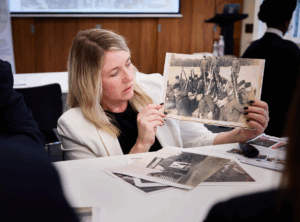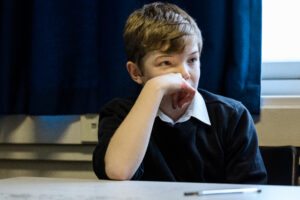Researchers from the UCL Centre for Holocaust Education note with concern the impact of wider educational policy changes upon teaching and learning about the Holocaust in England’s secondary schools, as reported in The Sunday Telegraph on Sunday (20 June).
Their research suggests that, within Key Stage 3 history, much more teaching about the Holocaust is taking place with younger year groups than it was ten years ago despite teachers’ significant concerns that only older, Year 9 and above, students have either the necessary conceptual understanding or emotional maturity to fully engage with this history.
- Read the full Data Release :Continuity-and-Change-Data-Release-1
In 2009, research conducted by the UCL Centre for Holocaust Education reported that an overwhelming majority of teachers chose to deliver content on the Holocaust in the final terms of Year 9, as they felt students needed sufficient maturity and to have developed trusting relationships within classes to meaningfully engage with this complex and confronting history. However, ongoing analysis of comparative data collected in 2019 and 2020 indicates a marked increase in the proportion of teaching that now takes place with younger year groups.
Teachers who took part in the most recent research described this change as a direct consequence of some schools’ decision to deliver the full Key Stage 3 curriculum in two rather than three years to allow students to begin working towards GCSE specifications. They also outlined with concern the challenges this presents to their teaching, the compromises they felt needed to be made in terms of the content they could confidently deliver and ultimately, the negative impact this then had on the depth of their students’ understanding.
As Professor Stuart Foster, Executive Director UCL Centre for Holocaust Education, explains:
“Evidence of the increasing tendency to teach the Holocaust to students at a younger age in Key Stage 3 (e.g., 11-13 years old) history represents a worrying trend. For the vast majority of students Key Stage 3 is the last time that they will learn about this profoundly significant history at school. It is essential therefore that they study the Holocaust at an age when they have the maturity and conceptual ability to understand how and why it happened and to consider its contemporary significance.
Programme Director, Ruth-Anne Lenga, also believes these findings have significant implication, not only for classroom practice, but for how the Centre can best support teachers confronting this challenge:
“Teaching about the Holocaust needs to be handled with utmost care to ensure students wellbeing, but it also needs to tackle some of the most difficult and discomforting realities of the human condition. . . . If we are going to present our students with an honest, accurate, and serious study of the Holocaust – which we must do – students need to be as ready as they can be . . .
Although it is far from ideal for young people to be formally introduced to the Holocaust at a stage when many may just not be ready to grapple with its most challenging questions and emotional demands, the UCL Centre for Holocaust will do all it can to support teachers on the ground by adapting materials for age appropriateness and finding new ways to scaffold learning for younger students. At the same time we will continue to advocate for later teaching, in Year 9, wherever possible and for extended provision so that students can return to, expand and deepen their understanding of this important history in later years.



